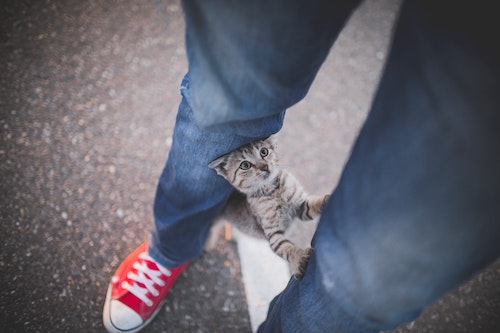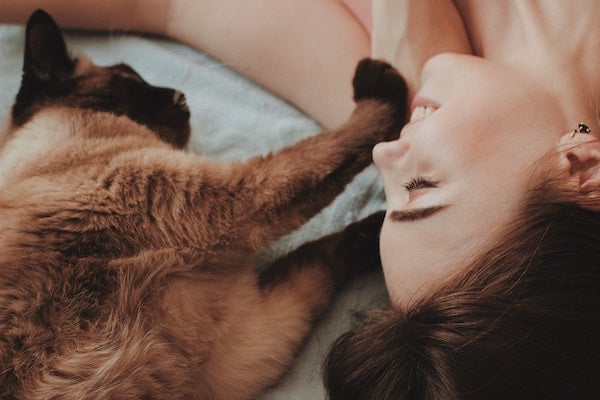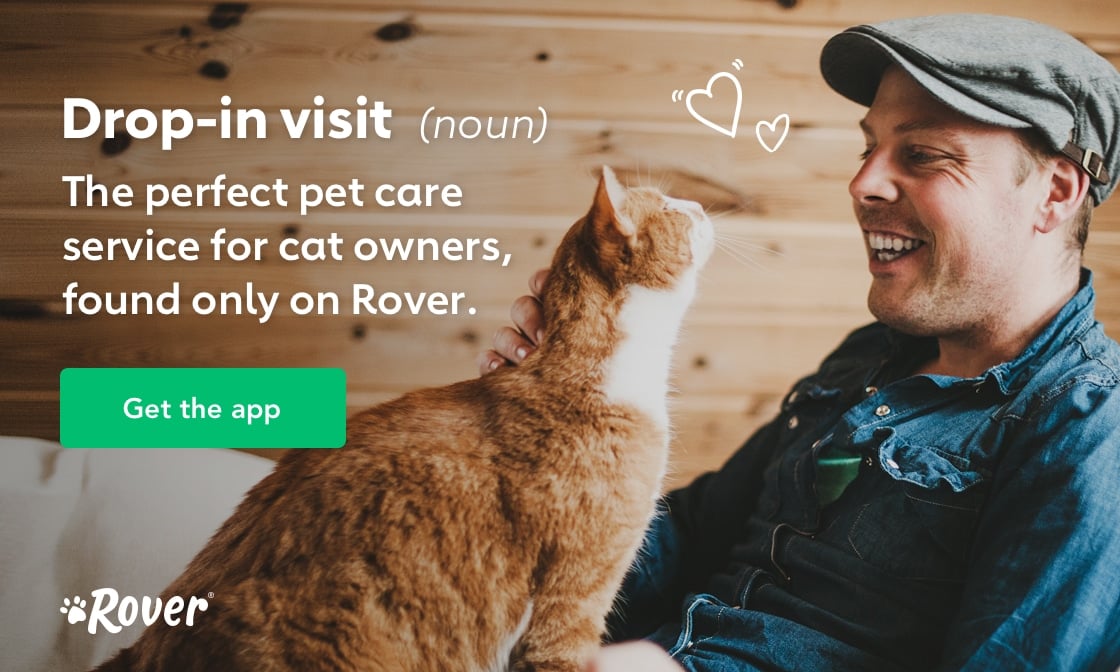Cats. They have so many behaviors that are confounding/hilarious/quirky/sweet that one has to wonder what goes on in those busy little feline brains? One of these behaviors that is strange to understand is the phenomenon of cats constantly rubbing against you. Whether it’s the “ankle figure 8” right after you’ve just rollered your pants or the “gonna smoosh my face on yours while you’re sleeping” sort, why is it that cats rub against you?

Reasons Cats Rub on…Everything
“Cats rely heavily on their sense of smell to give them information about their environment,” Dr. Stephanie Borns-Weil, a resident in Animal Behavior at the Cummings School of Veterinary Medicine at Tufts University, tells PetMD. Rubbing is a great way to both smell things and leave their scent behind. Whether it’s you or an inanimate object, rubbing on it allows a kitty to learn something about the person or environment, as well as leave its “mark” behind.
Marking
A cat rubbing itself on you, even your face, is a form of marking, and includes everything from people to door frames, table legs, cabinets–pretty much anything. Cats have scent glands in their cheeks, chins, foreheads and at the base of their tails so when they rub these parts on things, or people, it leaves their special scent behind. We can’t smell this, but other cats can. This behavior isn’t territorial, like spraying, but more of a friendly action. The scents they leave behind contain pheromones which are the same type found in synthetic pheromone blends many experts recommend for anxious kitties. Because these pheromones don’t stay fresh forever, cats will often mark the same spots over and over again.

Head Butting or “Bunting”
“When a cat rubs or pushes its head against you, also known as head butting or bunting, the cat is also marking you with his scent in a show of affiliation,” Borns-Weil further explains. “Affiliative behaviors serve to maintain a connection within a group of individuals. Head rubbing is a cat’s way of marking its people and its environment and grouping them together with the same scent.” Head butting also shows trust, Amy Shojai, a certified animal behavior consultant, explains to Catster. “It also places the cat’s face and eyes in vulnerable positions. So, it’s not only expressing friendliness, but also trust.”
Information Gathering
Some confident cats may rub against people they don’t know as a way to find out more about them. People carry all kinds of smells on them, as any dog owner can attest, and this greeting allows a cat to determine whether this person is acceptable, as well as where they may have come from and what animals they may have, or have been around. Though this may seem like–any, indeed, may be–a friendly behavior, experts such as Borns-Weil note “some cats don’t want to be petted but want information from you.” In other words, just because an unfamiliar kitty is rubbing on you, doesn’t mean it wants you to rub on it. Use caution, as always, when getting to know a new friend.

Affection
Another reason cats rub is simply to show affection. Dr. Jill E. Sackman, senior medical director for BluePearl Veterinary Partners’ Michigan Region tells PetMD, “head rubbing is a behavior cats learn as kittens with their mother. It’s an affectionate gesture that can also be used as a form of greeting.”
Greeting
For kitties who live in multiple cat households, rubbing (and head butting) are extensions of the behaviors they learned as kittens from their mothers. You might notice when kitties awake from nap time, or when treats are being served, they may engage in a round of head butts with their companions–just saying hello (again) and confirming all is well with everyone. Your kitty may also run toward the door when they hear you coming home–that round of ankle-swishes you get is likely a big “hello”.
Need
Sometimes cats rub against us because they want something. Many cats know if they rub on you they are going to get a positive response from you–ideally, some rubs in return, maybe some treats, or brushings? Head butts, leg weaving, and more, can simply be cat ways of saying, “I like you. Do you like me, too?”
Further reading:
Zibby Wilder is a writer specializing in food, wine, travel/tourism, personalities and histories of place. She lives in Santa Fe, New Mexico.
The Dog People Newsletter
Sign up and get $25 off pet sitting and dog walking!

